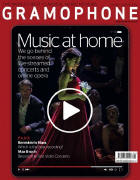Texte paru dans: / Appeared in:
|
|
|
Outil de traduction (Très approximatif) |
|
|
Reviewer:
David VIckers Contrary to the chronic pun, Vinci neither composed an opera about Julius Caesar nor conquered Britain – although some of his music was performed in London by Handel, who also borrowed a few ideas from works by the younger Calabrian musician. Franco Fagioli presents a dozen selections from seven different operas that stretch from 1725 to 1730, covering an assortment of orchestrations, moods and dramatic situations. Just over half of the arias have never been recorded before. The title-role in Il trionfo di Camilla (1725) was originally sung by the soprano Faustina Bordoni: Il Pomo d’Oro’s crisp playing, directed by violinist Zefira Valova, is a vivacious foil to Fagioli’s powerful coloratura in ‘Sembro quell’usignolo’. Vitige’s double despair at an angry lover and a former friend is conveyed in a punchy accompagnato and trippingly elegant simile aria ‘Sorge talora fosca l’aurora’ (L’Ernelinda, 1726); Fagioli’s agility across wide leaps, vividly spinning timbre and bold execution of copious fast trills are also fully to the fore when expressing Vitige’s optimism that storms will pass (‘Nube di denso orrore’). Cosroe’s guilty terror that he will be haunted by the ghost of an innocent son (‘Gelido in ogni vena’) was originally sung by a tenor (Siroe, 1726), but its vocal part is transposed up an octave for Fagioli’s emotive performance. ‘Quell’usignolo ch’è innamorato’ (Gismondo re di Polonia, 1727) has two lively sopranino recorders chirruping in partnership with Fagioli’s imitation of a nightingale, supported by elaborate extemporised solo flourishes from the harpsichordist; ‘Nave altera, che in mezzo all’onde’ (another aria originally for tenor) is a thrilling outburst with a pair of braying horns. ‘Barbara, mi schernisci’ (La Rosmira fedele, 1725), a gutsy minor-key outburst for Arsace complaining that Partenope mocks his love, is performed with jagged bitterness. Alexander the Great’s tour de force ‘Vil trofeo d’un’alma imbelle’ (Alessandro nell’Indie, 1730) pits Fagioli’s full-frontal volatility against valorous trumpets and thunderous timpani. There are two dissimilar scenes sung originally by Farinelli as the hero Jason in Medo (1728): the stormy aria di bravura ‘Scherzo dell’onda instabile’, sung as he steers a damaged ship to shore, and ‘Sento due fiamme in petto’, featuring melodious solo oboe over pizzicato basses and bowed upper strings, as Jason contemplates polyamorous feelings for Medea and his new flame Enotea (actually Medea in disguise). More complete Vinci opera recordings of this high calibre are needed. |
|




